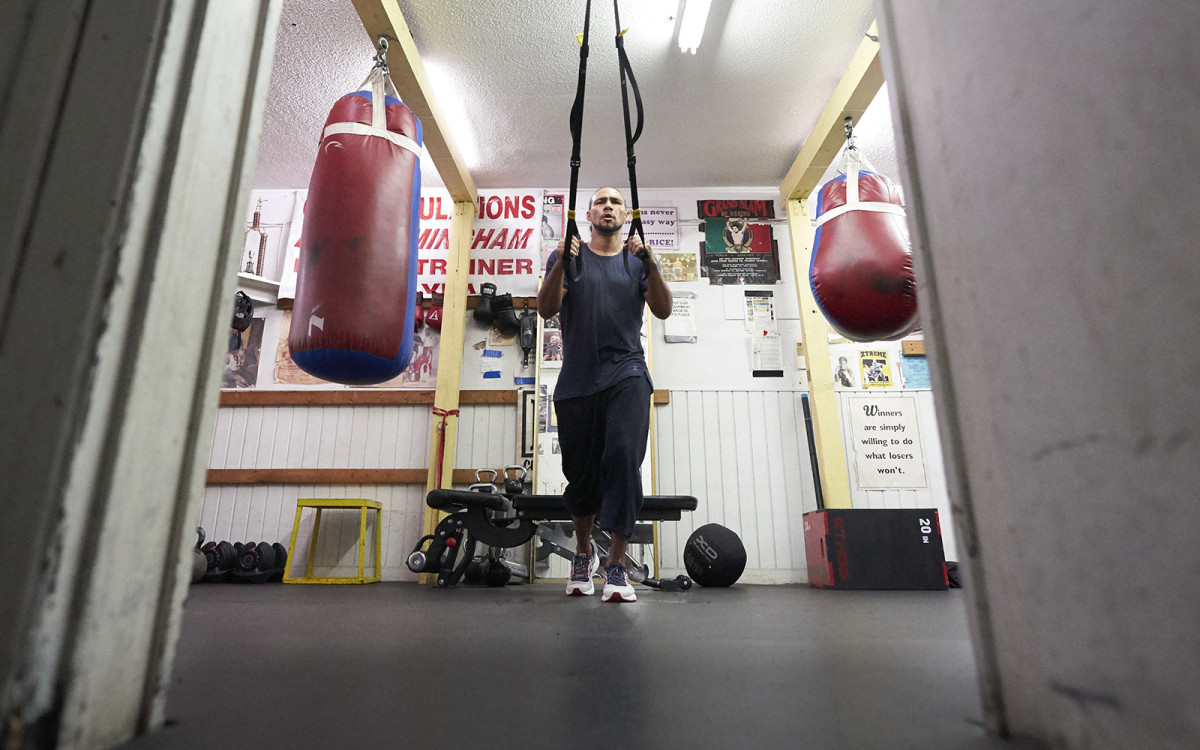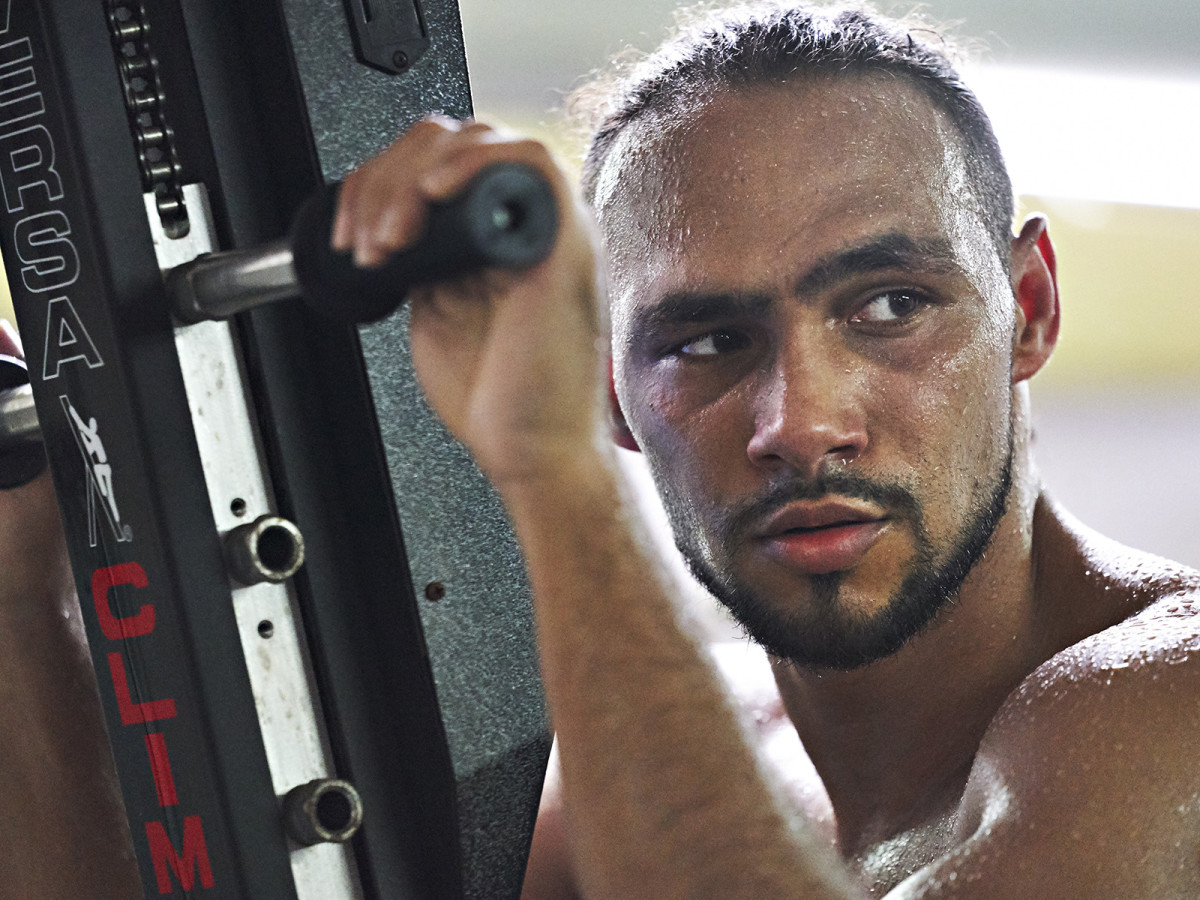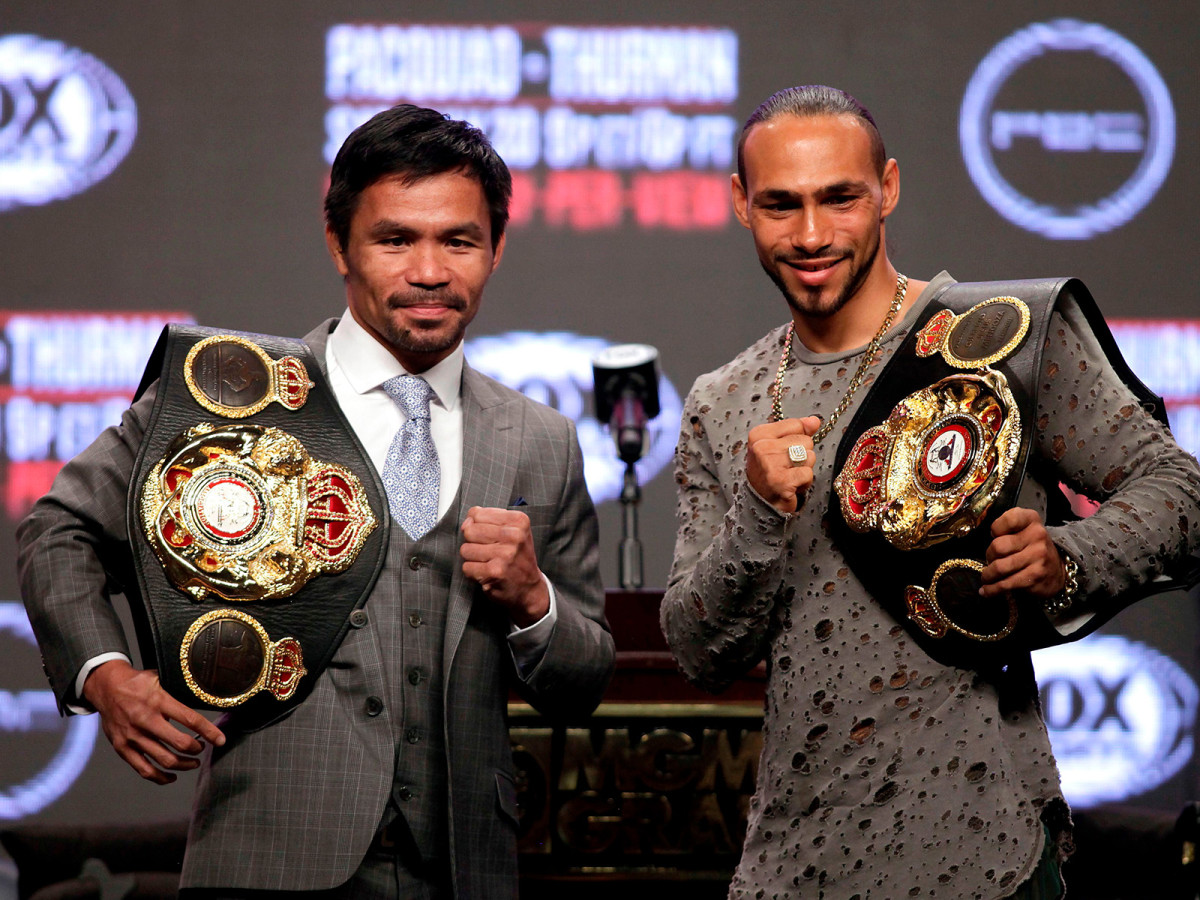Shadow Trainer: Ben Getty Is Gone, but Keith Thurman Is Still Listening

ST. PETERSBURG, Fla. – Keith Thurman pauses, midsentence. His voice chokes, briefly. His head bows. The bravado is gone. The cockiness of a world champion, one preparing for the biggest fight of his career, has faded. It’s late June, and Thurman is perched on a stool along the ring in the St. Pete Boxing Club. For weeks, cameras have followed him. For them, he goes into character. He preens in front of a mirror. He mean mugs as he goes through a workout. He bellows that Manny Pacquiao, who Thurman will attempt to defeat, perhaps retire, on Saturday when he defends his welterweight title against Pacquaio in Las Vegas, is finished. In this moment, though, the cameras are gone. In this moment, Thurman is just a man who misses his mentor.
The St. Pete Boxing Club was once a biker bar, refashioned when Dan Birmingham and his brother, Mike, purchased it in 1987. “It was a hell raising building back then,” says Birmingham. “Still is.” Peeling fight posters line the walls. Inspirational quotes (SUCCESS IS WHAT HAPPENS WHEN HARD WORK AND MOTIVATION MEET AMBITION … WINNERS ARE SIMPLY WILLING TO DO WHAT LOSERS WON’T) are taped alongside them. Winky Wright, a first ballot Hall of Famer, is the most notable fighter to train here. Someday, Thurman could be.
Birmingham smiles when remembering the first time Thurman walked into his gym. No more than 12 years old, brimming with confidence. At 15, Thurman was sparring with Antwun Echols, a veteran middleweight. At 16, he was in with Jeff Lacy, an ex-super middleweight champion. Before Wright took on Shane Mosley, in 2004, he sparred with Thurman; before he faced Felix Trinidad, in 2005, he banged with Thurman again. “Anybody that came in that door, it didn't matter if they were a world champ or what, he wanted to go in with them,” says Birmingham. “It didn't matter the experience level. If they knew how to fight and they were close to the weight, he wanted them.”
Fighter and trainer, Thurman and Birmingham have enjoyed enormous success. In 2013, Thurman stopped Diego Chaves, earning a minor piece of the 147-pound title. In 2015, Thurman was elevated to full champion, outpointing veteran Robert Guerrero in his first defense. In ’17, Thurman squeezed out a decision against Danny Garcia, unifying a pair of titles and making his case to be called the top welterweight in the world.
Birmingham cherishes these moments. Treasures them. But he won’t take credit for them. “That was Ben,” says Birmingham. “Ben did all the hard work.”
Merry Christmas to all! And big Thank You to Ben Getty (who got this all started), who is celebrating today upstairs! pic.twitter.com/2gHIgJ7Iuq
— Keith Thurman Jr. (@keithfthurmanjr) December 25, 2014
Ask Keith Thurman how he first met Ben Getty and he launches into an answer that takes nearly 10 minutes to finish. Elementary school, Thurman says. Getty was a custodian, ex-Army, a short, stocky Italian “with a demeanor that scared a bunch of kids,” says Thurman. A former power lifter, Getty gravitated towards boxing in the army, becoming a strength and conditioning coach for the boxing team at Fort Bragg, later working with fighters like Sugar Ray Leonard and Kenny Gould.
The underbelly of boxing eventually turned off Getty, who packed up and moved to Florida, taking a steady job at Belleair Elementary. But the boxing bug never left him. Working with kids still appealed to him. In nearby Clearwater, he started a boxing club. There, he met Keith Thurman.
In elementary school, Thurman was an athlete. Played everything. Boxing intrigued him. He went to one of Getty’s exhibitions. He watched a skinny sixth grader face off with a much bigger fifth grader. Bigger kid will win, Thurman reasoned. The skinny kid, a more polished boxer, busted him up.
Next, Getty called up one of Thurman’s classmates. “Little Johnny,” Thurman recalls. Smallest kid in school. At least one of them. Getty held up his mitts. Pop, pop, pop. Johnny’s hands cracked Getty’s mitts. Getty threw punches back. Johnny slipped right under them. Says Thurman, “I remember thinking, if he can teach Johnny how to throw, he can teach me how to throw.”
Thurman went home. He told his mother, Debra, he wanted to box. Debra went to the school to speak to Getty. She remarked that her son was pretty athletic. Getty told her that was what all mother’s say about their kids.
Thurman loved to fight. His father, Keith Sr., was a mixed martial artist. When he practiced, Thurman studied him. As a boy, Thurman preferred karate. Movie star karate. Jackie Chan. Steven Seagal. Bruce Lee. Chuck Norris. Boxing, Thurman decided, was karate without the kicking.
As a trainer, Getty was tough. He treated a seven-year old the same as he would a 20-something prospect. It weeded out the weak. Tough kids from the neighborhood would show up. Six months later, Thurman recalls, they would be gone. Thurman stayed. Getty was stunned by Thurman’s athleticism; Thurman embraced Getty’s relentlessness. Says Chris Getty, Ben’s son, “They were a perfect fit.”

And a successful one. Thurman was Getty’s robot. What I say you do, boy, Getty would say to Thurman. And he would. Getty began entering Thurman into tournaments. Thurman began winning them. “Ten years old, 70-pounds and he was dominating,” says Chris Getty. At 11, Thurman was messing around with his father. He popped him in the kidney. Dad grimaced. “For four seconds, says Keith Sr., “I almost forgot he was a kid.” The trophies piled up. The accolades, too. “I was a highly trained athlete,” says Thurman.
It came with a cost. Boxing has no seasons. Thurman was in the gym all the time. At 13, Thurman decided to take a break. He quit boxing. Took up football. Made the junior varsity team. Played every position. Started off as an offensive lineman, moved to linebacker, hopped in on special teams. Even had a stint as the punter. Got to play at Raymond James Stadium, home of the Tampa Bay Buccaneers. Developed a reputation as a big hitter—several teammates referred to him as “De La Hoya.”
Thurman was a good football player. But he didn’t love it. “I'm just not a team sports guy,” says Thurman. “I can't rely on somebody else for victory. I can't stand if they fumble a ball. I can't stand if they move offsides. I can't stand not being in the game. It was fun, but it wasn’t boxing. It wasn't me and Ben Getty.”
At 14, Thurman went back to Getty. “He was really happy to see me,” says Thurman. The training remained the same. But Thurman was a little bigger. And his power was starting to grow. On the first day in the gym, Thurman hit the heavy bag. Hard. By the end, Thurman was exhausted. Getty was impressed. “He just said, ‘You're gonna start knocking 'em out, boy,’” Thurman recalls. “You're hitting too hard—you're gonna start knocking them out."
He was right. An amateur came down from Orlando to spar with Thurman. Thurman knocked him out. Then a young pro, 21, with three fights on his résumé. Thurman dropped him twice. A month later, Thurman entered a local tournament. He scored a knockout. A nickname—“One Time”—was born. A reputation, too. “A lot of people knew at the national tournaments that I was a big puncher,” Thurman says. “We were known as ‘Samson,’ the boy with the long hair.”
Getty sought to harness that power. As athletic as Thurman was, his footwork was sloppy. “Ben hated my footwork,” Thurman says. So his message was simple: Just sit down and punch. “He really loved move-forward fighters,” Thurman said. “I think Ben Getty would have been a tremendous fan of Canelo Álvarez.”
In 2007, Thurman competed at the U.S. Olympic trials. He finished second, losing to Demetrius Andrade in the finals. He was offered the chance to be the alternate at the 2008 Olympics. He passed. “I didn’t want to be a bench boy,” says Thurman. He turned pro instead.
Fighting locally, Thurman racked up the wins. And the knockouts—eight in a row to start his career, all in the first round. Birmingham assisted Getty. Getty helped Birmingham with his amateur program. Birmingham worked the mitts for Thurman. The trio seemed destined for greatness.
In May 2009, Thurman arrived at the gym for a weekend sparring session. The week before had been hell. Getty had been disappointed in Thurman’s sparring the week before. “A little bit of bulls---,” Thurman recalls Getty calling it. Thurman was determined to redeem himself. He arrived at the gym. Getty wasn’t there.
Thurman called Chris Getty. Days earlier, Ben had been at the VA, dealing with a heart problem. Needed new medication. Chris and his brother, Scott, went to check on their father. They found him in the kitchen, on the floor. Pills were everywhere. “He was still alive, but pretty messed up,” Chris said. A friend came over to check on him. Ben started to come around. He ate. He talked. Chris thought he would be OK. That night, Andre Berto—a Winter Haven, Fla. native—was defending his welterweight tile against Juan Urango. Chris asked his father if he wanted to come over and watch. His father declined, saying he just wanted to rest.
The next morning, Scott went over to the house. His father was on the couch. He was gone, dead at 63. “I think it was his medications,” says Chris. “When they changed his medications, I think it messed with him and caused him to have a heart attack.”
An hour later, Chris called Thurman and delivered the news. “When I got the call, I had a feeling it wasn't going to be any good news on the other end,” says Thurman. “And not only wasn't it good news, it was some of the worst news.”
Thurman disappeared. “I didn’t see him until the funeral,” Chris said. Shattered, Thurman spent time in a nearby park, where Getty would send him to run countless miles after training. “I was really into my Buddhist texts at that time,” says Thurman. “I took one of my books with me. I sat down. I meditated. I tried to talk to his spirit, and just tried to handle the situation the best that I could. Meditation and prayer were some of my outlets.”
A week later, Thurman was back in the gym. But his heart wasn’t into it. “He was still devastated,” said Keith Sr. He did a couple of pullups. “The most half–assed pullups you will ever see,” Thurman says. He thought about Getty, and what Getty might say if he saw him dogging it in a training session. He finished the day.

Moving forward, Thurman needed a new head trainer. His manager at the time, Shelly Finkel, suggested Freddie Roach. Thurman wasn’t interested. “I just lost the No. 1 person in my life,” said Thurman. “I need somebody who can relate to me and my upbringing, and knew Ben Getty, and knew how Ben Getty trained me, and saw what we were doing, and could continue what we were doing. Luckily for me, Dan Birmingham, he was already working with me since I was 14 years old.”
Less than a month after Getty’s passing, Thurman was back in the ring. Birmingham, a longtime presence in his corner, was now running it. That night, Thurman scored a third–round knockout. Two months later, he picked up another. Birmingham has continued to apply the techniques Getty drilled into Thurman, while harnessing more of the athleticism Thurman is blessed with.
“In my opinion, I had two world-class trainers,” said Thurman. “When Ben passed away, I had one.”
Ben Getty wasn’t big on compliments. “There was a ‘good job boy, I’m proud of you,’ after I won a tournament,” said Thurman. “But from everyday hard work, nothing.” One, though, Thurman remembers. And this is where the emotions begin to surge through him. He was a young pro, still a teenager, and happened to be within earshot of an interview Getty was giving to a local newspaper. The question was simple: What’s your favorite thing about working with Keith? Getty’s response: "Right before the fight to just, you know, sit down and watch.”
Thurman pauses as he recalls the memory. “The moment I heard that was the moment I knew that I was a great fighter,” Thurman said. “Because my trainer just said that his favorite thing to do is to sit down and watch, not give a command, not tell me what to do. It really made me happy, and it gave me a lot of confidence to not second-guess myself that, at that time, I was already a tremendous and great fighter because Ben Getty, with his many years of boxing knowledge, likes to watch me perform.”
It has been just over 10 years since Getty passed. Thurman honors him in the ring, wearing his name on his trunks. And he remembers him in the locker room, before every fight. Show him your power, Getty would often remind Thurman. He is not going to know what to do with you. “I think about him always,” said Thurman. “I want to make him proud.”

Thurman wishes Getty could be there Saturday, when he takes on a boxing icon in Pacquiao, when he fights on boxing’s biggest stage. Some of the shine has come off Thurman since his defining win against Garcia. He sat out nearly two years with multiple injuries. His return fight, a decision win over Josesito Lopez, was lackluster. He got married during his time off, and there have been questions about whether his desire to be great remains as strong.
“I know the fire is still burning inside,” says Birmingham. “I knew it was just a matter of time before everything healed up and he got back to be Keith Thurman again.”
Against the 40-year-old Pacquiao, Thurman, 30, plans to be aggressive. He hasn’t had a knockout since stopping Luis Collazo, in 2015. He believes Pacquiao can help end that streak. A win will not only add the most significant name to his résumé, but set him up for a unification fight against the winner of Errol Spence-Shawn Porter, slated for September. It’s an opportunity to make his case, again, that he is the best welterweight in the world.
And a chance to honor Ben Getty. He will remember everything Getty taught him before the fight. And he will remember to thank him after. “I know that we've definitely made him proud by now,” said Thurman. “We definitely made sure that Ben Getty is not a liar. He said, when I was 14 years old, that this boy would be a world champion, and we became world champion multiple times. Here we are, we're fighting some of the best fighters in the world, and we're going to defeat Manny Pacquiao. And I can't wait to dedicate this victor to Ben Getty once again.”
